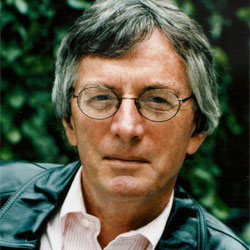To lighten the language up, or to dark it back down
Becomes the blade edge we totter on.
To say what is true and clean,
to say what is secret and underground,
To say the things joy can’t requite, and to say them well …
This is the first conundrum.
The second is like unto it,
the world is a link and a like:
One falls and all falls.
In this last light from midsummer’s week,
who knows which way to go?
The great blue heron wheels up the meadow
and folds into Basin Creek.
Only the fish know which angle his shadow will make.
And what they know is not what he knows,
Which is neither light nor dark nor joy,
but is just is, just is.
Notes on the Poem
You can't hear the visual layout of a poem when it is read aloud to you. How does a poem play in your head when you read it and can see features such as line indentations? Try reading "Little Landscape" by Charles Wright out loud, and see if the features on the page affect how you express those lines and deliver the overall poem. The indents vary and pick up where each previous line leaves off, creating an organically ragged effect. Unlike all the left-aligned lines, the indented lines are not capitalized, which seems to indicate that they are part of the sentence or thought in the preceding line. Yes, that seems to fit in each case. Why then are they arranged this way? Is the effect, visually and in terms of how you read or absorb them, that the lines are intoned more under the speaker's breath, perhaps? Whatever the reason, the enigmatic line indentations add another element of mystery to a poem that is already wistfully questioning, not knowing ... "who knows which way to go?" "And what they know is not what he knows" but ultimately, softly accepting of that not knowing: "but is just is, just is." That the last line is indented actually lends it quiet emphasis rather than somehow diminishing it or presenting it as an afterthought. Do you find yourself hanging on that last thought as it resonates, perhaps by virtue of where it sits on the page, whether you're reading it aloud or to yourself?

Thoughtful poem. The indentations add emphasis, it seems to me.
This is lovely to look at, to read quietly, and to read out loud. It’s great to take a break from my online course to read a poem. Thanks for this one!